How To Train A Dog Not To Bite? – (Effective Steps)
Nipping and biting are some of the common problems of dog owners. Still, there’s a way on how to train a dog not to bite, especially if the nibbles are starting to draw blood. However, it has to be done carefully so you won’t be injured should your dog responds with yet another bite. Socialization, obedience training, and desensitization will help a lot in reducing your dog’s biting tendency. You should only use positive reinforcement because violence will only fuel further aggression.
Why do dogs bite?
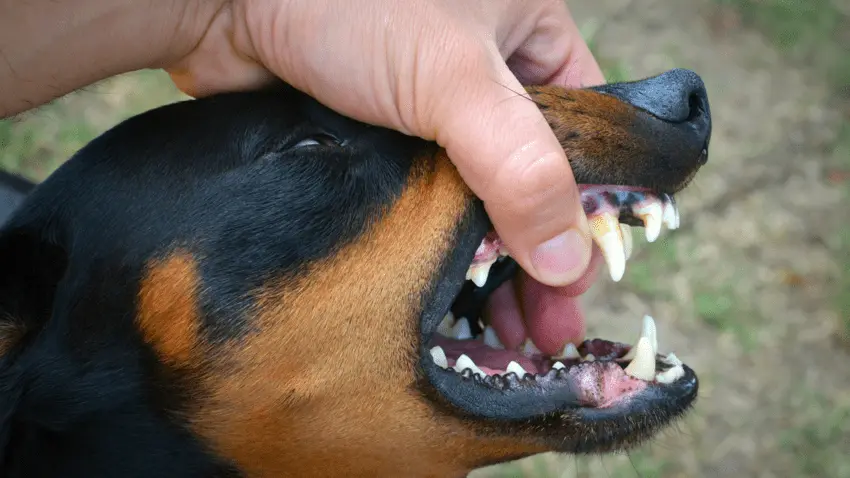
Biting among dogs can either be playful mouthing or aggressive behavior.
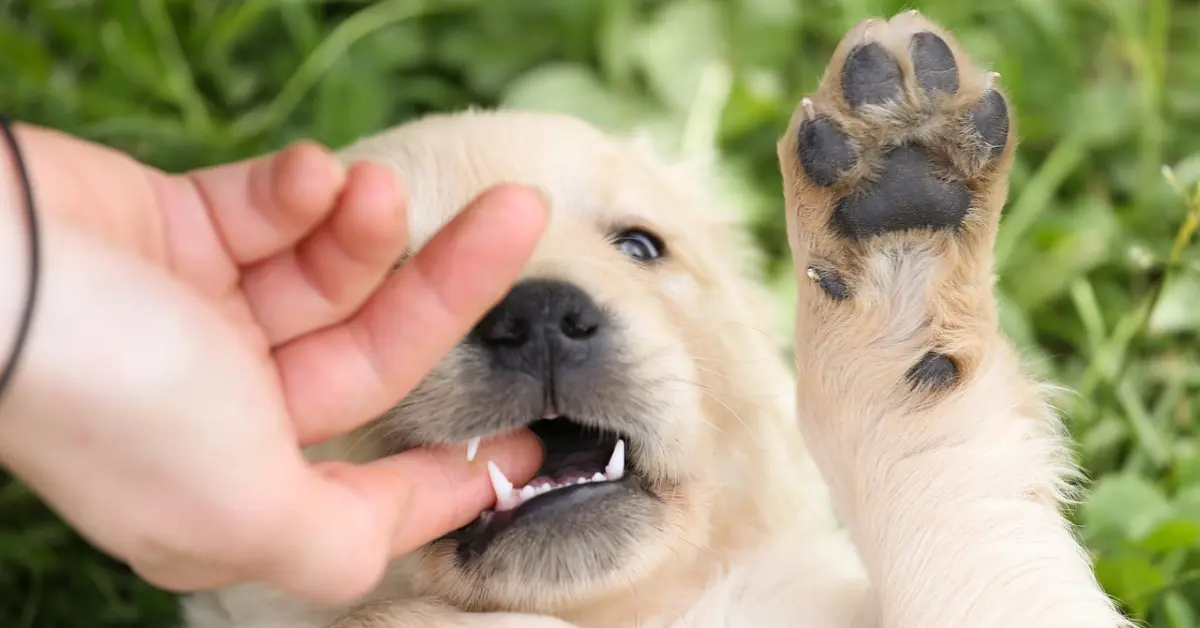
With playful mouthing, your dog will bite, but it won’t usually draw blood. When a playful dog “bites”, it would have a relaxed disposition, sometimes wagging its tail to initiate playtime. While its muzzle will look a bit wrinkled, it’s not usually a powerful or aggressive bite. Your playfully biting dog will keep its mild latch on your skin to taunt you to respond.
On the other hand, aggressive biting is quicker and not playful. This bite will draw blood and would often be accompanied by snarling, bared teeth, a wrinkled muzzle, and a stiff body. Such behavior should be acted upon as an aggressively biting dog can injure passers-by and other animals it will encounter.
Nevertheless, you shouldn’t encourage playful biting either. As your dog grows, it will be painful and lead to aggressive biting later on.
The following are the most common reasons why dogs may bite:
- Stress. Dogs will bite when they are stressed and triggered by an external factor. It could be a loud sound, a rowdy toddler, or another dog.
- Being territorial. If another dog trespasses on your dog’s territory, it would bite the other canine to defend its space. However, it can also result in redirected aggression, which means biting the person nearest to the dog.
- Feeling sick. Dogs are on edge when they are in pain or ill. They can quickly get irritated, and they will bite as a way to stop the trigger that’s annoying them.
- Playfulness. A dog, especially a puppy, will bite during rough play. This isn’t aggression, but you still shouldn’t tolerate such behavior.
- Poor socialization. Dogs, especially those bred for hunting and guarding, are likely to bite if not socialized well. It’s their innate characteristic that must be dampened as early as possible.
How to stop a dog from biting
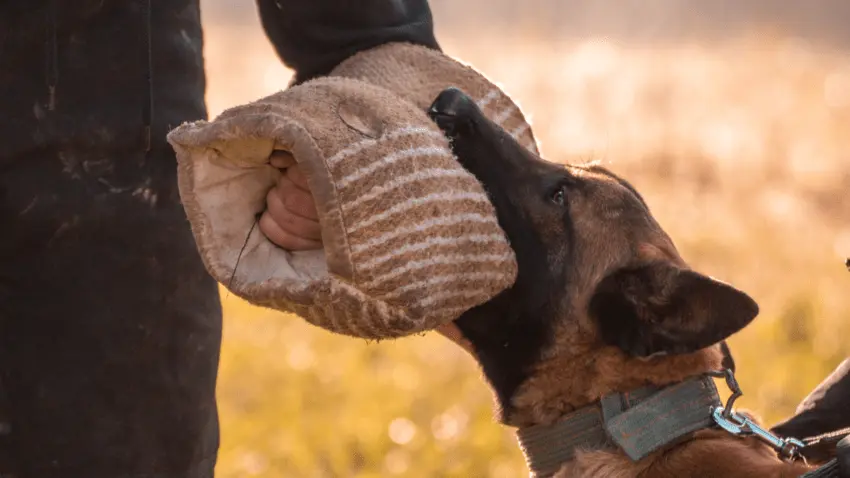
Biting is a serious problem and must be addressed right away. In many cases, if owners can’t suppress their dog’s excessive biting tendencies, the police can seize the animal and surrender it to a local shelter. To prevent that, here’s how to train your dog not to bite: read more here dog play bites liability.
- Determine the cause. Before you train your dog, you must identify what’s causing its biting habit. It’s best to bring your dog to the vet to rule out any health problems. You can also talk to an animal behaviorist or dog trainer to figure out how to train your dog to grow out of biting.
- Start with socialization. One of the most important parts of raising a dog is socialization during its first weeks of life. This will get your dog accustomed to different sounds, scents, and sceneries. Proper socialization will also hamper your dog’s tendency to bite.
- Don’t tolerate biting. If your puppy bites during playtime, stop and end the session right away. Keep all the toys away, so your dog will learn that biting has negative repercussions.
- Give an alternative. If your dog is an aggressive chewer, you should give it an alternative. This way, your dog will not bite or chew on people’s skin. You should get chew toys and other things that will train your dog not to bite.
- Put the dog on time out. If your pup bites put it inside the bathroom for 10 minutes. This time out phase will help your dog calm down and make it realize that there are consequences to biting. By the way, never use the crate for this purpose. You’d never want your dog to associate crating with punishment.
- Give your dog enough exercise. A hyperactive dog will always be excited and on edge. When this happens, it will likely bite anyone out of boredom and excitement. You can prevent this by giving your high-energy dog enough exercise and daily walks. Such walks are also an excellent way to desensitize your dog to different outdoor stimuli.
- Desensitize your dog. Desensitization is a training method where you expose your dog to its triggers slowly. Through this, your dog will develop a level of tolerance before you increase the trigger’s intensity. Make sure that your dog is on a leash and well-supervised to prevent any biting incidents.
- Obedience training. A dog that has undergone obedience training is less likely to bite strangers and other animals. It teaches your dog alternative behavior like sitting, staying, or lying down when a stranger is around. Still, you have to train your dog to learn each command.
- Never hit your dog. Physical violence is a mortal sin when training your dog not to bite. It will result in exactly the opposite of what you want to happen. Violence will make your dog more aggressive and ready to bite.
When do puppies stop biting so much?
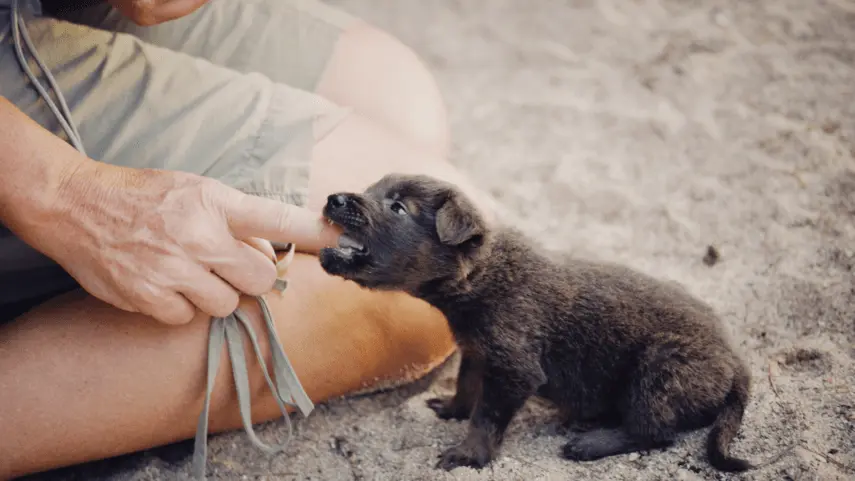
If you brought a new puppy home, you’ll learn quickly that puppies are notorious for nipping and chewing during their teething phase. They also explore around using their mouths. Usually, this nippy behavior will slow down once the pup grew all its adult teeth, which is around seven months of age.
However, you should train your puppy not to bite to ensure that it will outgrow the behavior. Remember that puppies bite for attention, and if they keep getting what they want through it, the pup will keep biting as it grows older. Positive corrections are necessary. Like what experts say, start them young.
For teething puppies, it’s essential to give them some alternatives. Buy some soft chew toys and prepare some frozen treats to appease its aching gums. All these will help your puppy not to bite.
Exercise and socialization will also help a lot in inhibiting your dog’s biting tendencies. While some breeds are more involved in biting incidents, you can fix it through proper training as early as possible.
How to train a dog not to bite strangers
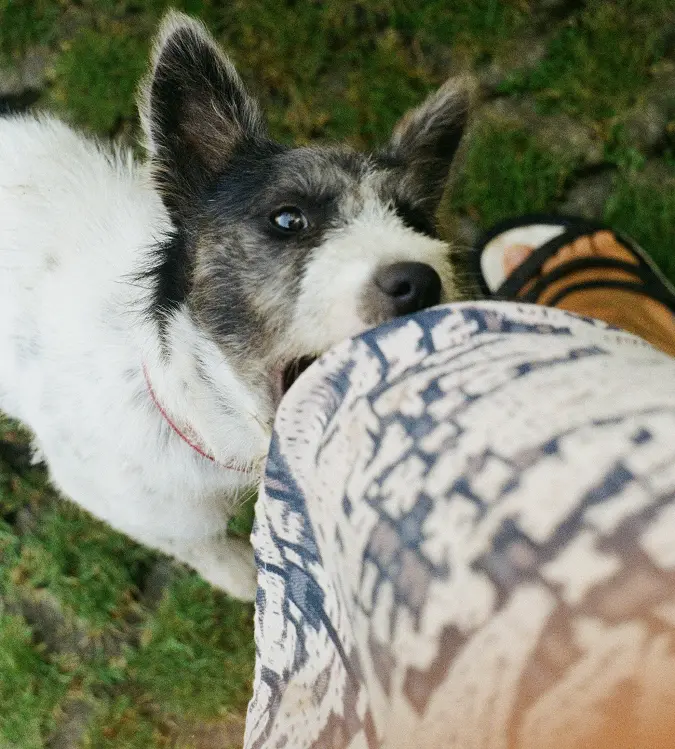
If your dog is only attacking strangers, you have to keep your dog leashed. Desensitization is necessary here, so your dog will learn not to bite anyone it’s unfamiliar with. please read here what is the least effective method to retrieve a dog that has got off leash
First, leash your dog and ask it to sit. Next, ask a stranger to stand at a distance from your dog. If your dog growls or shows any negative reaction, say a firm ‘No!’ and command it to go back to its sitting position.
If the dog calms down and sits back, give a tasty treat as a reward. After that, ask the stranger to take a step closer. If your dog shows aggression, repeat the process above. Do this over and over again until your dog can tolerate a stranger being around.
You should also vary the person you’re exposing your dog to and the day of the training. Also, you must conduct the training slowly, especially if you have a neurotic dog.
Some dogs will take time to learn not to bite a stranger. If your dog is a rescue canine, it may have experienced maltreatment in its younger years. Patience and understanding are necessary here, so your dog will soon learn not to bite anyone.
Conclusion
Is your dog a biter? There’s always a way on how to train your dog not to bite anyone. It’s a process that may take weeks or months to succeed. If your efforts are not seeing results, it’s best to ask the help of a dog trainer for a more professional approach. The trainer can help identify what’s triggering your dog to bite and what to do about it.
